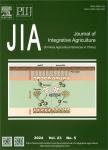In vitro meat production: Challenges and benefits over conventional meat production
In vitro meat production: Challenges and benefits over conventional meat production作者机构:Division of Livestock Products Technology Faculty of Veterinary Sciences and Animal Husbandry Sher-e-Kashmir University of Agricultural Sciences and Technology of JammuJammu 181102 India Division of Biotechnology University of KashmirSrinagar 190006 India
出 版 物:《Journal of Integrative Agriculture》 (农业科学学报(英文版))
年 卷 期:2015年第14卷第2期
页 面:241-248页
核心收录:
学科分类:0832[工学-食品科学与工程(可授工学、农学学位)] 08[工学] 083202[工学-粮食、油脂及植物蛋白工程]
主 题:in vitro meat history advantages techniques problems
摘 要:In vitro meat production system is the production of meat outside the food animals by culturing the stem cells derived from farm animals inside the bioreactor by using advanced tissue engineering techniques. Besides winning the favour of animal rights activists for its humane production of meat, in vitro meat production system also circumvents many of the issues associated with conventional meat production systems, like excessively brutal slaughter of food animals, nutrition-related diseases, foodborne illnesses, resource use, antibiotic-resistant pathogen strains, and massive emissions of methane that contribute to global warming. As the conditions in an in vitro meat production system are controlled and manipulatable, it will be feasible to produce designer, chemically safe and disease-free meat on sustainable basis. However, many challenges are to be faced before cultured meat becomes commercially feasible. Although, the production cost and the public acceptance are of paramount importance, huge funds are desperately required for further research in the field.



